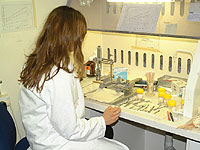| Advanced Science - 3972 |
|
|||||||||||||||||||||||||||||||||||||||||||

Program Summary
The Bachelor of Science (Advanced Science) program is designed to cater for the specific abilities and interests of talented students.
A feature of the design of the Advanced Science programs is the requirement that all students enrol in a specific study plan on commencement of the program. Each study plan is designed to link courses in such a way that a coherent pattern of study is achieved in a specific discipline or specialisation. A wide choice of study plans, designed to meet specific aims and objectives, is available. Most study plans are identified with a particular school or discipline (e.g Anatomy, Chemistry), but some are multidisciplinary (e.g Mathematics and Computer Science). Note: Some courses and plans are only available in the Advanced Science programs, e.g.: Mathematics and Finance, Neuroscience, Physics and Astronomy. The program differs from the standard Bachelor of Science program (3970) in that it includes advanced level courses, an Honours year and options tailored to an individual's aptitude and interests. Program Objectives and Learning Outcomes Advanced Science aims to provide students with a working knowledge of areas of scientific investigation in order to place them at the forefront of research and discovery in the many rapidly developing areas of Science.
Conditions for the Completion of the Advanced Science Program
Study Plans Available in Advanced Science
Advanced Mathematics
Anatomy Applied Mathematics Biochemistry Biological Science Biotechnology Chemistry Ecology Food Science and Technology Genetics Geosciences Marine and Coastal Studies Mathematics and Computer Science Mathematics and Finance (program 3986) Medical Chemistry Medical Microbiology and Immunology Microbiology Molecular Biology Neuroscience Pharmacology Physical Oceanography/Meteorology Physics Physics and Astronomy Physics and Computing Physiology Psychology Pure Mathematics Statistics Table X
General Education Requirements Students in this program must also satisfy the University's General Education requirements. For further information, please refer to General Education in the Table of Contents (see left-hand side of this page).
See also "Conditions for the Completion of the Advanced Science Program" above.
Rules on Progression and Transfer in the Advanced Science Programs
1. Transferring Study Plans
Students must apply in writing to transfer between study plans within each of the Advanced Science programs. Applications are assessed on academic performance and approval is subject to places being available in the nominated study plan. 2. Accelerated Progression in Advanced Science Programs There is provision for exceptionally talented students to take higher level courses in Stage 1. Contact the Science Student Centre for details. 3. Progression to Stage 4 Honours in Advanced Science Progression to Stage 4 is subject to academic performance. Students seeking to enrol in a Stage 4 Honours are required to have the approval of the Head of School and normally will be required:
Students should also seek the guidance of the appropriate Head of School at an early stage of study to ensure that the study plan being followed is best suited to lead to the Year 4 Honours.
In addition, admission to a particular Stage 4 Honours is subject to appropriate research and supervision resources being available. Quotas may be imposed for entry in any year, in which case admission will be determined on academic merit. Students who do not attain an average or 65 or higher in Stage 3 of their program are normally required to transfer to the Science program (3970) and take out the BSc award at Pass level. 4. Transfers from Advanced Science to the Science Program Students enrolled in the Advanced Science programs (program codes 3972; 3986) who wish to take out the BSc award at Pass level and without proceeding to Stage 4 are required to transfer to the Science program (3970). Applications to transfer should be lodged no later than the census date for the session in which the student expects to satisfy requirements. Students applying after that date may not be able to graduate in the next round of graduation ceremonies. The application should state the 3970 major in which the student wishes to be enrolled. Students must satisfy all requirements for the designated Science major in order to qualify for the award of the BSc. Further information regarding the transfer from the Advanced Science program to majors that are available in the Science program is available through the Science Student Centre. Students entering Year 3 or Year 4 of a combined degree program will need to consult with the Science Student Centre. 5. Elective Courses Students enrolled in any Science program may normally only take as electives any courses (subject to satisfying prerequisites) which are specified as electives for their degree, or available within a major or minor in program 3970. 6. Graduation and Study Plans In order to graduate, students must satisfy requirements for the award by passing all courses and the requirements specified for their program. Students who complete requirements will be awarded the degree of Bachelor of Science at Honours or Pass level with a major in the area of specialisation (usually indicated by the name of the major or study plan, except that for Honours candidates the name of the Honours specialisation will appear). Students who successfully complete Stage 4 of their program will be considered for the award of Honours. The following scale generally applies to Honours gradings and, depending on the structure of the program, is based either on performance in the Stage 4 Honours or on performance over the whole 4 stages of the program: Honours Class 1 - mark or weighted average of 85 or greater Honours Class 2 Division 1 - mark or weighted average from 75 to 84 Honours Class 2 Division 2 - mark or weighted average from 65 to 74 Honours Class 3 or Pass - mark or weighted average below 65 The award will appear on the testamur as: Bachelor of Science with Honours in (name of specialisation) For information regarding fees for UNSW programs, please refer to the following website: https://my.unsw.edu.au/student/fees/FeesMainPage.html
|
||||||||||||||||||||||||||||||||||||||||||||

| Contacts | Library | myUNSW | WebCT |